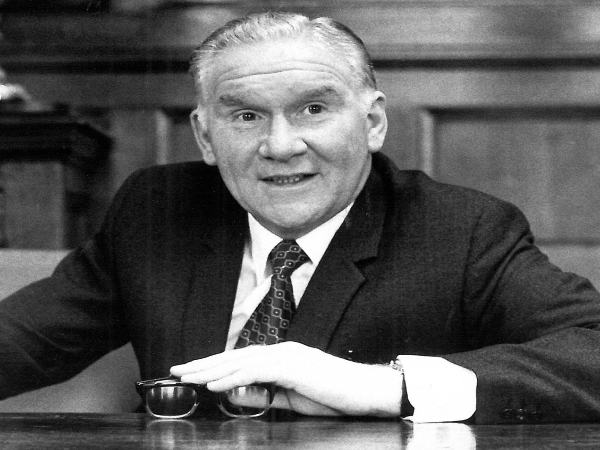Bill Nicholson: The Legendary Football Icon Who Shaped Tottenham Hotspur’s Glory
Exploring the Life, Career, Legacy, and Personal Aspects of Bill Nicholson, Tottenham Hotspur's Greatest Manager

Bill Nicholson is a name synonymous with the rich history of Tottenham Hotspur. From his humble beginnings to his rise as a legendary player, manager, and coach, Nicholson’s 55-year association with the club left an indelible mark on English football. This article delves into the life of Bill Nicholson, highlighting his career achievements, family life, personal wealth, and the profound influence he had on Tottenham Hotspur. We will also explore the legacy of “Mr. Tottenham” and how his impact continues to inspire future generations of football enthusiasts.
Early Life of Bill Nicholson
William Edward Nicholson, better known as Bill Nicholson, was born on January 26, 1919, in Scarborough, North Yorkshire. He was the youngest of four children in a working-class family. From a young age, he showed a passion for football and joined the local team as a young boy. His natural talent soon caught the eye of scouts, and by the age of 17, Nicholson joined Tottenham Hotspur as an apprentice.
Bill Nicholson’s early years were marked by dedication and hard work. He quickly became known for his tactical awareness and discipline on the field. His playing career was interrupted by World War II, during which he served in the British Army. However, once the war ended, Nicholson returned to Tottenham Hotspur in 1946, where he began making his mark on the football world.
Bill Nicholson’s Playing Career
Nicholson’s playing career began in earnest after World War II, as he became a regular member of the Tottenham Hotspur first team. Playing primarily as a right half, he was a vital part of the team’s success in the late 1940s and early 1950s. Nicholson was a key figure in the famous “Push and Run” team, which was known for its fast-paced attacking play.
Nicholson earned one international cap for England in 1951. He made his debut against Portugal and scored a goal just 19 seconds into the match, setting a record for the fastest goal on debut in England’s history. However, after several years of playing at the top level, Nicholson’s playing career was cut short by injuries, and he retired in 1955.
The Managerial Rise of Bill Nicholson
After retiring from playing, Bill Nicholson turned to coaching and management. He became the manager of Tottenham Hotspur in 1958, taking charge of a team that had a rich tradition but was in need of fresh leadership. Nicholson’s tenure as manager is considered one of the most successful in English football history.
Under his guidance, Tottenham Hotspur achieved incredible success. The pinnacle of Nicholson’s managerial career came in the 1960-61 season when he led Spurs to the First Division title and the FA Cup, making them the first team in 20th-century English football to win the “Double.” In 1962, he once again led the team to an FA Cup victory and brought them to the semifinals of the European Cup.
Bill Nicholson’s most notable achievement came in 1963 when he guided Tottenham Hotspur to victory in the European Cup Winners’ Cup, making them the first British club to win a European trophy. Nicholson continued to build on his success, claiming multiple FA Cups, League Cups, and even the UEFA Cup in 1972. His tactical acumen and leadership brought international recognition to the club.
The Legacy of Bill Nicholson
Bill Nicholson’s legacy is not just defined by the trophies he won, but also by the lasting influence he had on Tottenham Hotspur. His approach to football was characterized by discipline, hard work, and an emphasis on teamwork. Nicholson instilled a sense of pride in the players and fans alike, earning the nickname “Mr. Tottenham” due to his deep connection to the club.
He was not only a successful manager but also a visionary who helped shape the modern identity of Tottenham Hotspur. The club’s style of play, its emphasis on youth development, and its commitment to excellence were all deeply influenced by Nicholson’s leadership. He remained an active figure in the club even after his retirement as manager, contributing to the club as a scout and adviser.
In recognition of his contributions, Tottenham Hotspur named a road leading to their stadium “Bill Nicholson Way.” His ashes were interred beneath the pitch at White Hart Lane, ensuring his presence would forever be a part of the club. When the stadium moved to its new location, Nicholson’s ashes were reburied at the new Tottenham Hotspur Stadium, symbolizing his undying connection to the club.
Bill Nicholson’s Family and Personal Life
Bill Nicholson’s family life remained largely private, but it is known that he married in 1950. He had two children, a son and a daughter. Despite his fame, Nicholson led a relatively humble life outside of football. He was known for his professionalism, humility, and integrity, which made him not only a respected figure in football but also a beloved one in his personal life.
His dedication to his family and his club was paramount. While much of his time was dedicated to football, Nicholson made sure to maintain a strong connection with his loved ones. His life outside of football was marked by simplicity, a stark contrast to the public attention and pressure that came with being one of the greatest football figures of his time.
Bill Nicholson’s Net Worth
Bill Nicholson’s net worth is somewhat difficult to quantify due to the era in which he played and managed. Football salaries in his time were not as lucrative as they are today, and while Nicholson’s managerial career was highly successful, much of his wealth came from his long association with Tottenham Hotspur and various roles within the club.
It is estimated that Bill Nicholson’s net worth, when adjusted for inflation, would be significant, though exact figures are not readily available. His wealth was not defined by luxury or excess, but rather by his invaluable contributions to football, both on and off the pitch. His true legacy is measured not in financial terms but in the profound impact he had on Tottenham Hotspur and the sport of football as a whole.
Bill Nicholson’s Age at Death
Bill Nicholson passed away on October 23, 2004, at the age of 85. He left behind a legacy that is still celebrated by Tottenham Hotspur fans and football enthusiasts worldwide. His passing marked the end of an era for the club, but his memory and influence continue to live on.
At the time of his death, Nicholson had witnessed decades of football history, both as a player and as a manager. His age at death reflected a life well-lived, one dedicated to the sport he loved and the club he transformed into one of the most successful in England.
Bill Nicholson’s Impact on Football and Tottenham Hotspur
Bill Nicholson’s contribution to football is immeasurable. Not only did he help Tottenham Hotspur achieve unprecedented success, but he also left a lasting impact on the culture of the club. His managerial career, which spanned over 15 years, set the standard for excellence in English football. He introduced tactical innovations, nurtured young talent, and helped Tottenham become a force in both domestic and international football.
Even after his passing, Nicholson’s influence is still felt at Tottenham Hotspur. His impact on the club is deeply woven into the fabric of its history, with many of today’s players and managers drawing inspiration from his legacy. The current Tottenham Hotspur stadium stands as a testament to his dedication, with his ashes resting beneath the ground of a venue that bears his name.
Conclusion
Bill Nicholson is much more than just a football manager; he is a symbol of excellence, dedication, and success. Through his remarkable achievements, he forever changed the course of Tottenham Hotspur’s history and left a lasting legacy in the world of football. His personal qualities, his strategic mind, and his ability to lead Tottenham Hotspur to victory have made him one of the greatest figures in English football.
As we reflect on his life, career, and achievements, it is clear that Bill Nicholson’s contributions to the sport go far beyond the trophies he won. He shaped a footballing dynasty that continues to influence the game today, ensuring that his memory will never fade from the annals of football history. His place in the hearts of Tottenham Hotspur fans and football lovers across the globe remains firmly secured.



